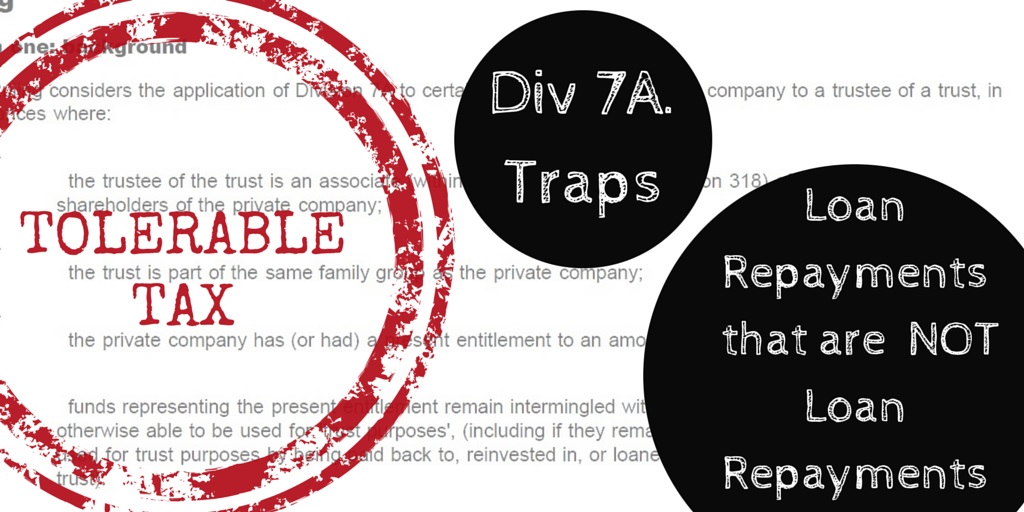
In this Tolerable Tax post, I want to discuss a Division 7A trap, specifically, where loan repayments made are NOT considered loan repayments for the purpose of Division 7A.
Division 7A (or Div 7A for short!) is an anti-avoidance measure designed to prevent private companies from making tax-free distributions of profits to shareholders or to their associates in the form of payments, loans, forgiven debts or via the use of private company assets.
If Div 7A applies, amounts paid, lent or forgiven by a private company to a shareholder or their associate are treated as deemed unfranked dividends, unless certain exclusions apply. The main exclusions are that the loan is repaid or put on a complying Div 7A loan agreement before the lodgement date or due date for lodgement (whichever is earlier) of the income tax return for the year in which the loan was made. Note that if a Div 7A loan option is used, then annual principle and interest repayments will be required moving forward.
So to avoid a deemed unfranked dividend arising under Div 7A, one of the crucial elements to understand is what is specifically excluded from being treated as a “repayment” for the purposes of Div 7A. This is specifically dealt with under s.109R, titled “Some payments relating to loans not taken into account”.
The general purpose of s.109R is to prevent arrangements to avoid the application of Div 7A to loans that involve repaying them, where there is an intention of re-lending the funds to the taxpayer.
In summary, a repayment must be disregarded for the purposes of Div 7A if a “reasonable person” would conclude that:
1. Having regard to all of the circumstances, that the shareholder or shareholders associate intended to obtain a loan or loans from the private company of a total amount similar to or more than the repayment required; or
2. Having regard to all of the circumstances, if a new loan or loans was made to the shareholder or shareholders associate before he or she makes the repayment to the private company and the loan or loans were obtained in order to make the repayment.
The Commissioner does not have discretion here. If the “reasonable person” test concludes that the payment is disregarded, a Div 7A deemed dividend will arise. Now, there are some exceptions to s.109R, including where repayments are (note this list is not exhaustive):
1. “Set off” against a dividend payable by the private company, or salary, wages and other kinds of payments subject to PAYG withholding ; or
2. An amount paid to the private company by a third party on behalf of the shareholder or shareholders associate where the amount is assessable income of the borrower in the income year in which it is made or in an earlier year (for example you direct a debtor to make a payment directly to the private company rather than to you personally).
If you are currently dealing with a Div 7A loan, please keep in mind that there are not only requirements surrounding WHEN the loan must be repaid, but also HOW the repayment is made. Don’t inadvertently trigger a deemed unfranked dividend just because you were not aware of that your payment would be considered an “excluded repayment”!
So where to from here:
- If you are a shareholder or shareholders associate and you have borrowed an amount from a private company, consider the application of Div 7A;
- Consider when the payment or loan needs to be repaid to the private company, so as to avoid a deemed unfranked dividend arising;
- Just as important, discuss with your tax advisor and confirm that the repayment you make will not be an excluded repayment for the purposes of Div 7A!
Let me know in the comments if you would like a particular topic discussed in a future instalment of TT and I will do my best to accommodate! Remember, I am unable to give advice, but am always happy to share my thoughts on an area of tax.
Please remember, Tolerable Tax does not contain specific advice. Each taxpayer’s circumstances differ and you should always seek advice (specific to you) before taking any action.
If you require assistance with understanding your Div 7a requirements, please contact us.


